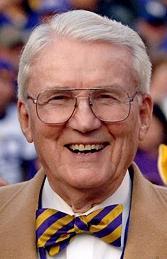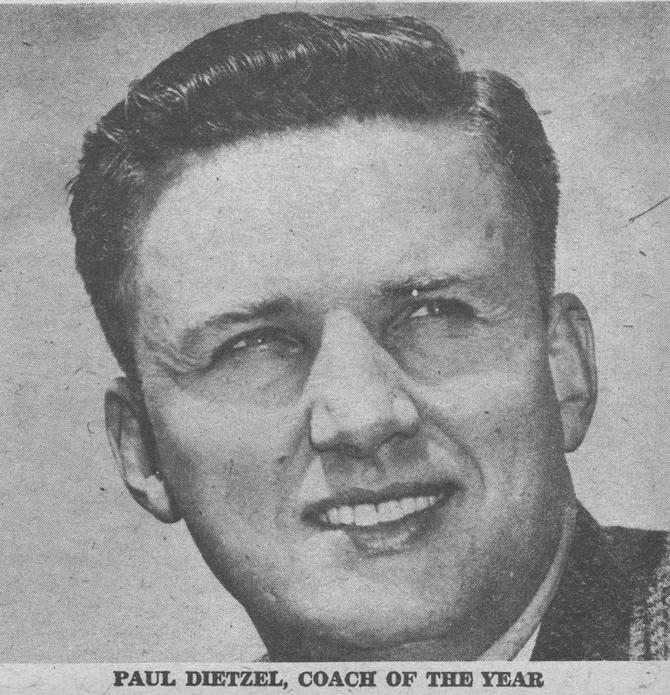In 1955, Paul Dietzel arrived in Baton Rouge to coach a football team without much to boast about.
Twenty-one coaches had come and gone in the previous 62 years, and LSU had only one bowl win in six postseason appearances. But when Dietzel departed to take the reins at Army in 1962, he left behind a national championship, a Heisman Trophy winner and Chinese Bandits.
So when the news surfaced of Dietzel’s passing at the age of 89 on Tuesday, the Baton Rouge community mourned accordingly. Dietzel is survived by his children, grandchildren and wife, Anne, but the entire LSU fanbase felt the blow of his death.
“That man was a serving person,” said LSU coach Les Miles after practice Tuesday. “He was as supportive a man as anyone I’d ever been around. He loved this school and loved his association with our team. He will be missed.”
Miles said the team will likely honor Dietzel with some sort of uniform or helmet decal as the season moves forward.
After serving in the Air Force during World War II and earning All-American accolades as a center in college at Miami University of Ohio, Dietzel, a native of Fremont, Ohio, made several two-year stints as an assistant coach from 1948 to 1954. He jumped from Army to Cincinnati to Kentucky, and he spent another year as an assistant at Army before accepting the LSU job at 30 years old.
Dietzel failed to achieve a winning record during his first three years in Baton Rouge, but a stroke of genius in 1958 propelled the Tigers to their first national championship of the wire era.
In a time when many players started on both sides of the ball, Dietzel devised a three-team system to keep his players fresh. Dietzel dubbed his second-string defense the “Chinese Bandits,” and the unit largely contributed to LSU’s 11-0 season and national title in 1958.
“The more we looked at our squad, the more we came to the conclusion we had players, after our first 11, who could play one way,” Dietzel said in his autobiography “Call Me Coach: A Life in College Football.” “Finally, we decided to put together two units and work them one way about 80 percent of the time in practice.
The Tigers continued their success under Dietzel in 1959, finishing the season with a 9-2 record and a second-consecutive Sugar Bowl appearance. That same year, running back Billy Cannon won the Heisman Trophy and remains the only Heisman winner in LSU history.
After a down year in 1960, Dietzel closed out his tenure at LSU with 10 wins and an Orange Bowl victory in 1961. Army came calling in the offseason, and Dietzel became the first non-graduate head coach at the school that kick-started his career.
“It was tough leaving,” Dietzel told the Concordia Sentinel of Ferriday, La., in 2005. “I never considered going anywhere else because I thought LSU was the best coaching job in America. I loved the LSU fans. They are crazy and passionate about it. I had never considered West Point because they had never had a non-graduate coach. When they came around and asked me if I would be interested, it opened a door I thought would never be opened.”
Dietzel managed to win 21 games through four seasons at Army before his hiring as South Carolina’s head coach. Through nine seasons with the Gamecocks, Dietzel won 42 games while qualifying for only one bowl game.
Following short stints as the commissioner of the Ohio Valley Conference and athletic director at Indiana, Dietzel found his way back to Baton Rouge in 1979 when LSU hired him as athletic director. During his tenure, Dietzel created the Varsity Club, which eventually became the Tiger Athletic Foundation.
Dietzel hired Bo Rein to succeed Charles McClendon as football coach, but Rein’s sudden death in a plane crash less than two months later forced Dietzel to hire former LSU running back Jerry Stovall.
Senior Associate Sports Information Director Kent Lowe, who was a graduate student at the time of Rein’s death, recalled covering the tragedy for various media. Lowe also conducted one of the final on-air interviews with Dietzel at the unveiling of the Louisiana Sports Hall of Fame building in June.
Following a reassignment within the Athletic Department in 1982, Dietzel assumed the athletic director position at Samford and built the program until his retirement in 1985. Dietzel and his wife, with whom he would have celebrated 69 years of marriage this year, eventually returned to Baton Rouge, where he produced watercolor paintings and penned an autobiography.
Dietzel is a member of both the Louisiana Sports Hall of Fame and the LSU Athletics Hall of Fame, and his accomplishments and innovations as coach and athletic director changed the face of LSU football forever.
“He was an amazing man,” Lowe said. “He was a great ambassador for college athletics. He had a love for the school, there’s no doubt about it.”
Services will be Friday at First United Methodist Church, with visitation from 9 a.m. to 11 a.m. and the funeral service beginning at 11.
Legendary football coach dies Tuesday
September 24, 2013







